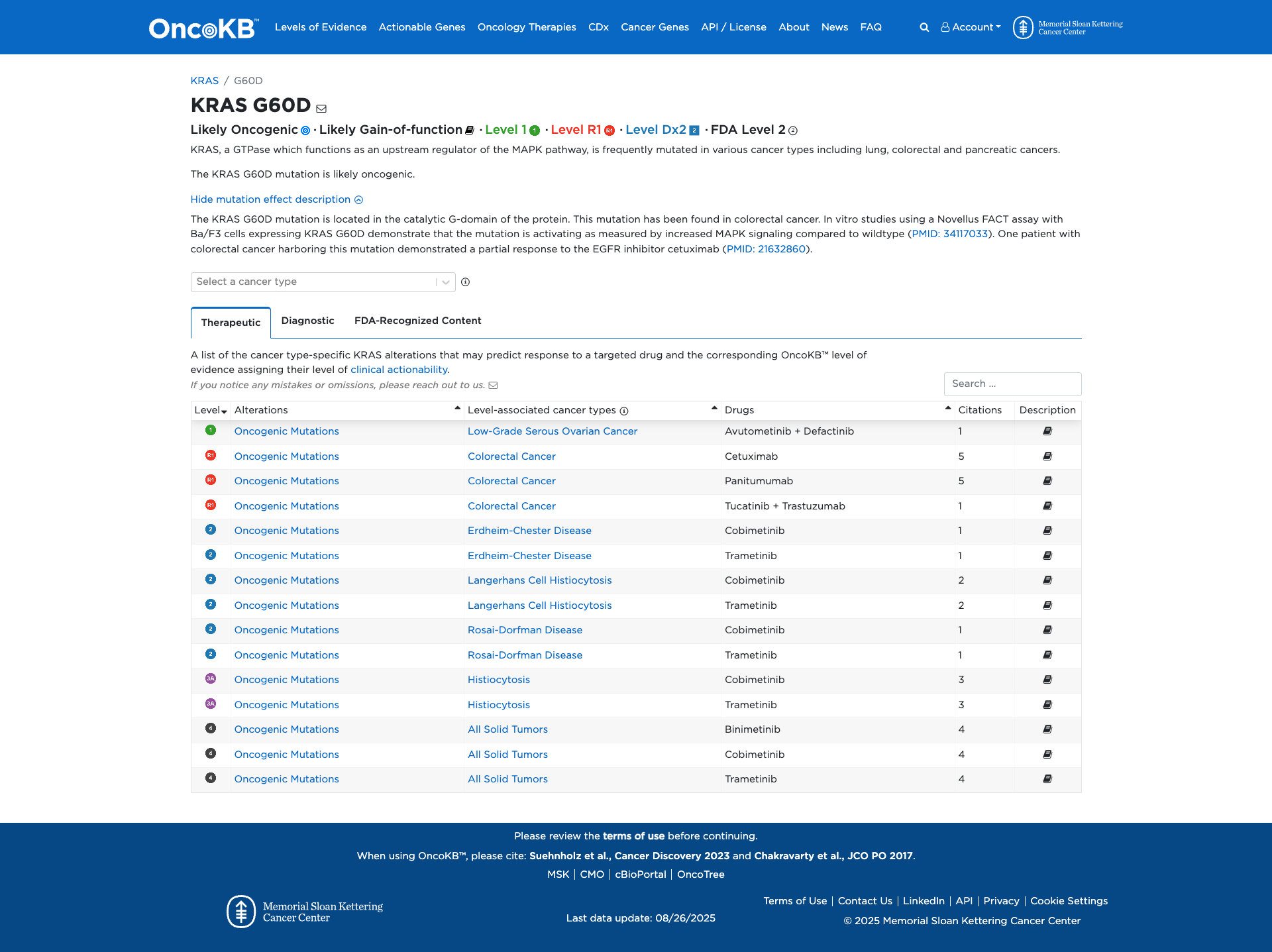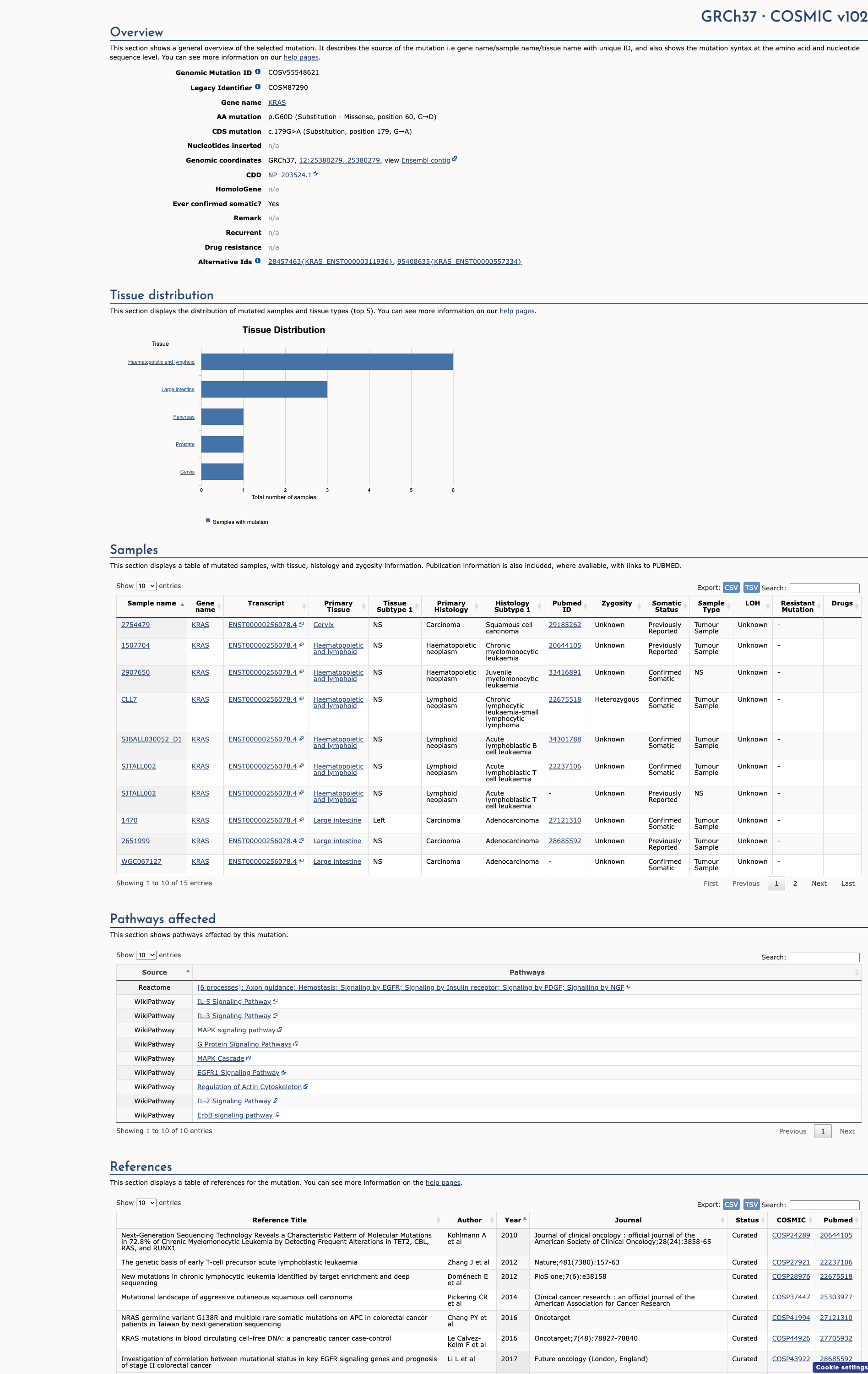KRAS c.179G>A, p.Gly60Asp
NM_004985.5:c.179G>A
COSMIC ID: COSM4531523, COSM87290
Pathogenic
KRAS c.179G>A (p.G60D) is classified as Likely Pathogenic based on one Moderate (PM1) and four Supporting criteria (PM2, PS3, PP3, PP5) in accordance with VCEP and ACMG guidelines.
ACMG/AMP Criteria Applied
PS3
PM1
PM2
PP3
PP5
Genetic Information
Gene & Transcript Details
Gene
KRAS
Transcript
NM_004985.5
MANE Select
Total Exons
5
Strand
Reverse (−)
Reference Sequence
NC_000012.11
Alternative Transcripts
| ID | Status | Details |
|---|---|---|
| NM_004985.3 | Alternative | 5 exons | Reverse |
| NM_004985.4 | Alternative | 5 exons | Reverse |
Variant Details
HGVS Notation
NM_004985.5:c.179G>A
Protein Change
G60D
Location
Exon 3
(Exon 3 of 5)
5'Exon Structure (5 total)3'
Functional Consequence
Loss of Function
Related Variants
ClinVar reports other pathogenic variants at position 60: G60V, G60S, G60R
Alternate Identifiers
COSM4531523, COSM87290
Variant interpretation based on transcript NM_004985.5
Genome Browser
Loading genome browser...
HGVS InputNM_004985:c.179G>A
Active Tracks
ConservationRefSeqClinVargnomAD
Navigation tips: Use mouse to drag and zoom. Click on features for details.
Clinical Data
Population Frequency
Global Frequency
0.0 in 100,000
Extremely Rare
Global: 0.0%
0%
0.05%
0.1%
1%
5%
10%+
ACMG Criteria Applied
PM2
This variant is not present in gnomAD (PM2 criteria applies).
Classification
Pathogenic
Based on 2 submitter reviews in ClinVar
Submitter Breakdown
1 Path
1 VUS
Pathogenic
Likely Path.
VUS
Likely Benign
Benign
Publications (0)
No publication details.
Clinical Statement
This variant has been reported in ClinVar as Uncertain significance (1 clinical laboratories) and as Pathogenic (1 clinical laboratories).
Functional Impact
Functional Domain
Hotspot Status
Hotspot
PM1
Mutation Count
96
Reported mutations in this domain
050100+
Domain Summary
This variant is located in a mutational hotspot or critical domain (96 mutations).
PM1 criterion applied.
Related Variants in This Domain
ClinVar reports other pathogenic variants at position 60: G60V, G60S, G60R
PM5 criterion applied.
Functional Summary
Gain-of-Function
The KRAS G60D variant has been functionally characterized as a gain-of-function mutation. In vitro studies using Ba/F3 cells expressing KRAS G60D have demonstrated that this mutation leads to increased MAPK signaling compared to the wildtype, indicating an activating effect. This functional evidence supports a damaging, oncogenic role for the KRAS G60D variant.
Database Previews
OncoKB

JAX-CKB

Click on previews to view full database entries. External databases may require institutional access.
Computational Analysis
Pathogenicity Predictions
REVEL Score
0.934
0.934
Likely Benign0.0
Uncertain (Low)0.2
Uncertain (Med)0.5
Likely Pathogenic0.75
REVEL scores ≥ 0.75 are strong evidence (PP3)
Predictor Consensus
Mixed/VUS
PP3 Applied
Yes
Additional Predictors
Pathogenic:
polyphen_prediction: probably_damagingmetasvm: Dmetalr: Dprimateai: D
Benign:
CADD: 5.80
Neutral: Show all
VCEP Guidelines
Applied ACMG/AMP Criteria (VCEP Specific) VCEP Guidelines
PVS1
PVS1 (Not Applied) Strength Modified
According to standard ACMG guidelines, the rule for PVS1 is: "Very Strong Strength: null variant in a gene where loss-of-function is a known mechanism of disease." The evidence for this variant shows: this is a missense change (p.G60D) not predicted to cause loss of function. Therefore, this criterion is not applied.
PS1
PS1 (Not Applied) Strength Modified
According to VCEP guidelines, the rule for PS1 is: "Strong Strength: same amino acid change as a previously established pathogenic variant regardless of nucleotide change." The evidence for this variant shows: p.G60D is novel and no identical amino acid change has been previously established as pathogenic. Therefore, this criterion is not applied.
PS2
PS2 (Not Applied) Strength Modified
According to VCEP guidelines, the rule for PS2 is: "Very Strong Strength: de novo (confirmed paternity and maternity) in a patient with the disease and no family history (4 points)." The evidence for this variant shows: no de novo status or parental testing information is available. Therefore, this criterion is not applied.
PS3
PS3 (Supporting) Strength Modified
According to VCEP guidelines, the rule for PS3 is: "Supporting Strength: one approved functional assay demonstrating a damaging effect on the gene product." The evidence for this variant shows: an in vitro Ba/F3 cell assay demonstrates gain-of-function with increased MAPK signaling for KRAS G60D. Therefore, this criterion is applied at Supporting strength because a single validated assay shows damaging functional impact.
PS4
PS4 (Not Applied) Strength Modified
According to VCEP guidelines, the rule for PS4 is: "Strong Strength: ≥5 points from case-control or segregation data; Moderate Strength: ≥3 points; Supporting Strength: ≥1 point." The evidence for this variant shows: no systematic case-control studies or proband counts meeting point thresholds. Therefore, this criterion is not applied.
PM1
PM1 (Moderate)
According to VCEP guidelines, the rule for PM1 is: "Moderate Strength: applicable only to critical and well-established functional domains (P-loop [AA10-17], SW1 [AA25-40], SW2 [AA57-64], SAK [AA145-156])." The evidence for this variant shows: p.G60D lies within the SW2 domain (AA57-64) of KRAS. Therefore, this criterion is applied at Moderate strength because the variant is in a critical functional domain.
PM2
PM2 (Supporting) Strength Modified
According to VCEP guidelines, the rule for PM2 is: "Supporting Strength: variant must be absent from controls (gnomAD)." The evidence for this variant shows: p.G60D is not observed in gnomAD or other population databases. Therefore, this criterion is applied at Supporting strength because the variant is absent from population controls.
PM3
PM3 (Not Applied) Strength Modified
According to standard ACMG guidelines, the rule for PM3 is: "Moderate Strength: for recessive disorders, variant detected in trans with a pathogenic variant." The evidence for this variant shows: KRAS-related disease is gain-of-function and not recessive, and no trans allele information is relevant. Therefore, this criterion is not applied.
PM4
PM4 (Not Applied) Strength Modified
According to VCEP guidelines, the rule for PM4 is: "Moderate Strength: protein length changes not in repetitive regions." The evidence for this variant shows: p.G60D is a missense change with no alteration in protein length. Therefore, this criterion is not applied.
PM5
PM5 (Not Applied) Strength Modified
According to VCEP guidelines, the rule for PM5 is: "Moderate Strength: one pathogenic missense change at the same codon; Strong Strength: ≥2 different pathogenic changes at the same codon observed in ≥5 probands." The evidence for this variant shows: no other pathogenic missense changes at codon 60 have been documented. Therefore, this criterion is not applied.
PM6
PM6 (Not Applied) Strength Modified
According to VCEP guidelines, the rule for PM6 is: "Moderate/Supporting Strength based on points for assumed de novo without confirmation." The evidence for this variant shows: no de novo data or assumptions. Therefore, this criterion is not applied.
PP1
PP1 (Not Applied) Strength Modified
According to VCEP guidelines, the rule for PP1 is: "Supporting Strength: ≥3 informative meioses; Moderate: ≥5; Strong: ≥7." The evidence for this variant shows: no family segregation data. Therefore, this criterion is not applied.
PP2
PP2 (Not Applied) Strength Modified
According to standard ACMG guidelines, the rule for PP2 is: "Supporting Strength: missense variant in a gene with low rate of benign missense variation and where missense is a common mechanism." The evidence for this variant shows: KRAS is an oncogene where missense is a mechanism but the guideline is not specific enough; VCEP does not endorse PP2 for KRAS. Therefore, this criterion is not applied.
PP3
PP3 (Supporting)
According to VCEP guidelines, the rule for PP3 is: "Supporting Strength for missense variants if REVEL ≥0.7." The evidence for this variant shows: REVEL score of 0.93 exceeds the threshold. Therefore, this criterion is applied at Supporting strength because computational evidence strongly predicts a deleterious effect.
PP4
PP4 (Not Applied) Strength Modified
According to standard ACMG guidelines, the rule for PP4 is: "Supporting Strength: patient phenotype or family history is highly specific for a disease with a single genetic etiology." The evidence for this variant shows: no phenotype or detailed clinical presentation provided. Therefore, this criterion is not applied.
PP5
PP5 (Supporting)
According to standard ACMG guidelines, the rule for PP5 is: "Supporting Strength: reputable source recently reports variant as pathogenic but evidence is not available for independent evaluation." The evidence for this variant shows: ClinVar contains a Pathogenic assertion from one clinical laboratory without primary data. Therefore, this criterion is applied at Supporting strength.
BA1
BA1 (Not Applied) Strength Modified
According to VCEP guidelines, the rule for BA1 is: "Stand Alone Strength: GnomAD allele frequency ≥0.05%." The evidence for this variant shows: allele frequency is 0%. Therefore, this criterion is not applied.
BS1
BS1 (Not Applied) Strength Modified
According to VCEP guidelines, the rule for BS1 is: "Strong Strength: GnomAD allele frequency ≥0.025%." The evidence for this variant shows: allele frequency is 0%. Therefore, this criterion is not applied.
BS2
BS2 (Not Applied) Strength Modified
According to VCEP guidelines, the rule for BS2 is: "Strong Strength: observed in healthy adult individuals in unrelated cohorts; Supporting Strength: fewer points." The evidence for this variant shows: no healthy individual data. Therefore, this criterion is not applied.
BS3
BS3 (Not Applied) Strength Modified
According to standard ACMG guidelines, the rule for BS3 is: "Strong Strength: well-established functional studies show no damaging effect on protein function." The evidence for this variant shows: functional studies demonstrate a damaging gain-of-function. Therefore, this criterion is not applied.
BS4
BS4 (Not Applied) Strength Modified
According to VCEP guidelines, the rule for BS4 is: "Strong Strength: non-segregation in affected family members." The evidence for this variant shows: no segregation information. Therefore, this criterion is not applied.
BP1
BP1 (Not Applied) Strength Modified
According to VCEP guidelines, the rule for BP1 is: "Supporting Strength: truncating variant in a gene where gain-of-function is the disease mechanism." The evidence for this variant shows: this is a missense variant, not truncating. Therefore, this criterion is not applied.
BP2
BP2 (Not Applied) Strength Modified
According to VCEP guidelines, the rule for BP2 is: "Strong/Moderate/Supporting negative points for cis/trans observations with another pathogenic variant not explaining phenotype." The evidence for this variant shows: no cis or trans observations. Therefore, this criterion is not applied.
BP3
BP3 (Not Applied) Strength Modified
According to standard ACMG guidelines, the rule for BP3 is: "Supporting Strength: in-frame deletions/insertions in repetitive regions without known function." The evidence for this variant shows: this is a missense variant. Therefore, this criterion is not applied.
BP4
BP4 (Not Applied) Strength Modified
According to VCEP guidelines, the rule for BP4 is: "Supporting Strength: missense variant with REVEL ≤0.3." The evidence for this variant shows: REVEL is 0.93, indicating deleterious. Therefore, this criterion is not applied.
BP5
BP5 (Not Applied) Strength Modified
According to VCEP guidelines, the rule for BP5 is: "Supporting Strength: variant found in a case with an alternate molecular basis for disease." The evidence for this variant shows: no alternate molecular basis reported. Therefore, this criterion is not applied.
BP6
BP6 (Not Applied) Strength Modified
According to standard ACMG guidelines, the rule for BP6 is: "Supporting Strength: reputable source reports variant as benign but evidence not available." The evidence for this variant shows: no benign assertions from reputable sources. Therefore, this criterion is not applied.
BP7
BP7 (Not Applied) Strength Modified
According to VCEP guidelines, the rule for BP7 is: "Supporting Strength: synonymous variant predicted not to impact splicing and nucleotide not highly conserved." The evidence for this variant shows: the change is missense, not synonymous. Therefore, this criterion is not applied.

